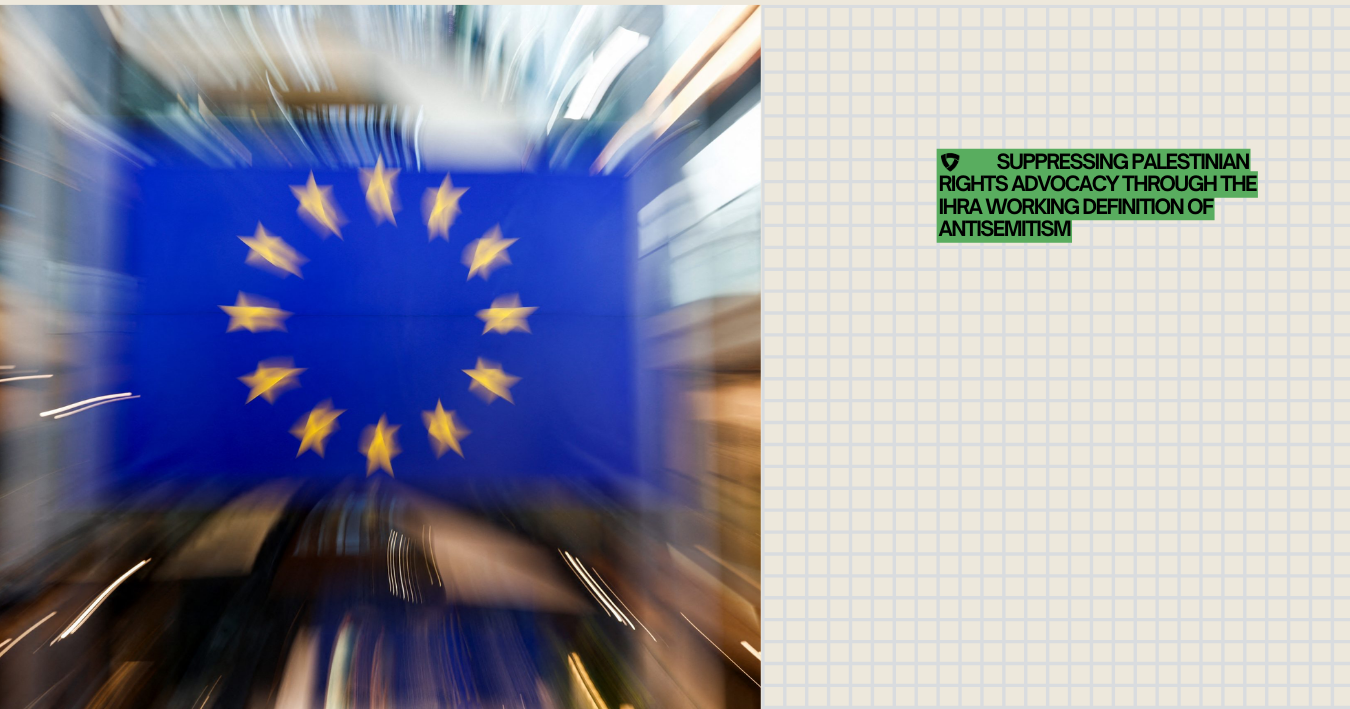Suppressing Palestinian Rights Advocacy through the IHRA Working Definition of Antisemitism
On 6 June 2023, the European Legal Support Center (ELSC) launched its new report “Suppressing Palestinian Rights Advocacy through the IHRA Working Definition of Antisemitism – Violating the Rights to Freedom of Expression and Assembly in the European Union and the UK”. The report is the first case-based account of human rights violations resulting from the institutionalisation and application of the controversial IHRA definition by the European Union and the UK. The growing concerns about the negative human rights impact of the IHRA definition, have so far been ignored by the EU.
The ELSC report is based on 53 recorded incidents between 2017 and 2022 in Germany, Austria and the UK, in which individuals, groups and organisations were accused of antisemitism based on the IHRA definition. All of the accused were targeted for advocating for Palestinian rights, denouncing Israel’s practices and policies and/or criticising Zionism as a political ideology. When legally challenged, most of these allegations of antisemitism were dismissed as unsubstantiated.
Analysis of the cases reveals a highly problematic pattern in which the IHRA definition is being implemented. Although it is advertised and promoted as “non-legally binding”, the definition is increasingly used by public and private bodies as if it was law. As a result, the IHRA definition chills free speech and curtails freedom of assembly, resulting in self-censorship of individuals afraid to face allegations of antisemitism.
As confirmed by the ELSC report, allegations of antisemitism invoking the IHRA definition are overwhelmingly aimed at Palestinians, Jewish activists and organisations advocating for Palestinian rights. This suggests the definition is being implemented in a discriminatory manner. Individuals who are targeted suffer a range of unjust and harmful consequences, including loss of employment and reputational damage.
Dr Younes, Independent Researcher and (Policy) Writer in Germany, said:
With the uncritical adoption at the political and academic level across Europe, it has become impossible to voice any critical opinion about Israeli policies in public or in academia without the risk of losing your job, contract, funding or future employment opportunities.
A student activist in a UK university reflected:
I found that the IHRA definition was deployed as a distraction tactic, where routinely I felt burnt out defending the right to freedom of expression and solidarity with Palestine […] I had crippling anxiety of who I could even trust, as it felt like the IHRA definition was a mode of surveillance in my day-to-day life.
The ELSC report also criticises the European Commission for consistently ignoring and dismissing the growing human rights concerns about the IHRA definition, and for failing to take measures to prevent any adverse impact of it on fundamental rights.
Giovanni Fassina, director at the ELSC, commented:
It is time for the European Commission to acknowledge and address that the policy it has been promoting and implementing on the basis of the IHRA definition, both at EU and member state level, is highly detrimental to fundamental rights and that it is fostering anti Palestinian racism.
The ELSC urges the European Commission, as well as the governments, parliaments and public institutions in the EU Member States and the UK, to cease and revoke the endorsement, adoption, promotion and implementation of the IHRA definition. While addressing and enforcing policies to combat antisemitism, the legal obligation of public actors to respect and protect freedom of expression and freedom of assembly must be upheld.
Currently, the United Nations is finalising its “Action Plan on monitoring antisemitism and enhancing a system-wide response”. Recently, the ELSC joined a letter of more than a hundred civil society organisations, urging UN Secretary-General Guterres and High Representative Moratinos not to adopt and apply the IHRA definition. In November 2022, 128 leading scholars in antisemitism, Holocaust Studies and related fields, warned the UN in a public statement against adopting the IHRA definition. In October 2022, the UN Special Rapporteur on Racism released a report sharply criticising the IHRA definition.
——-

